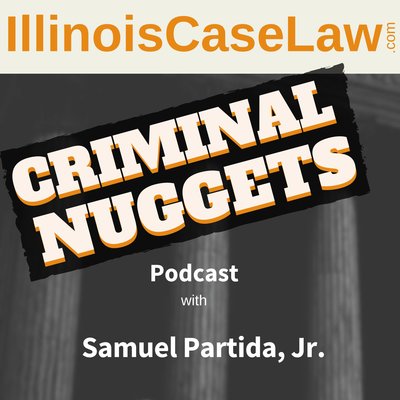Feb 27, 2017
People v. Edwards, 2017 IL App (3d) 130190-B (January). Episode 300 (Duration 5:42)
This 17 year old's confession was voluntary even though he had a fifth grade reading level, suffered from various mental disorders, and that the investigating officers did not allow him to speak to his mother.
Facts
Defendant executed a victim during a home invasion.
Defendant was sentenced to 90 total years. He and a co defendant broke into a home to steal drugs and money. Defendant put a pillow over the face of the man and shot and killed him.
He did the same thing to the woman but she did not die.
The Confession
Prior to trial, defendant filed a motion to suppress, claiming his confession to police was involuntary based on the fact that he was:
- 17 years old at the time
- had a fifth grade reading level
- suffered from mood disorder
- bipolar disorder
- and depression
- not taking his Depakote (prescribed medication)
- in special education classes and that
- the investigating officers did not allow him to speak to his mother or another concerned adult
despite his request to do so.
The trial court denied the motion.
Juvenile Confessions
Illinois courts have long recognized that receiving a confession from a juvenile is a “sensitive concern.”
As a consequence, the greatest care must be taken to assure that the admission was voluntary, in the sense not only that it was not coerced or suggested, but also that it was not the product of ignorance of rights or of adolescent fantasy, fright or despair.
Thus, in determining whether a juvenile’s confession was voluntarily given, relevant considerations include
(1) the juvenile’s age, intelligence, background, experience,
education, mental capacity, and physical condition at the time of
questioning;
(2) the duration of the detention, including whether the police
physically or mentally abused the juvenile or employed trickery or
deceit in obtaining the confession; and
(3) whether the juvenile had an opportunity to speak with a parent
or other concerned adult prior to or during the interrogation,
including 13 whether the police prevented or frustrated such
opportunities.
No single factor is dispositive; rather, the courts must consider the totality of the circumstances surrounding the confession.
Trial Court
The trial court thoroughly and methodically considered the factors of...
- defendant’s age
- intelligence
- background
- experience
- mental capacity
- education and
- physical condition
- at the time of questioning.
Defendant was no wide-eyed, 17-year-old that appeared immature.
Quite the opposite, defendant responded appropriately to questioning and was articulate, both during the interview and in his testimony during the suppression hearing.
Officers Played It Straight
While there was some allusion to force and deception on the part of officers in Westmorland, there was no such behavior exhibited by officers here.
The officers here were all trained juvenile officers.
Since this case was an “adult” case, the police did not have to contact his mother.
Youthful Offender Sentencing
The reviewing court side swiped the sentencing issue by noting that defendant was attacking the minimum sentence of 76 years, but he did not get the minimum.
He got more than the minimum. The court rejected defendant’s attempts to attack the constitutionality of sentences he did not receive.
Defendant received discretionary sentences. Kind of a weird way to handle this issue.
Why don’t they just say after balancing the crime with his history that he was not entitled to anything less?
See Also
Episode 210 - In re S.W.N., 2016 IL App (3d) 160080 (July)(This Voluntary Confession is Suppressed, Minor With IQ 70)



